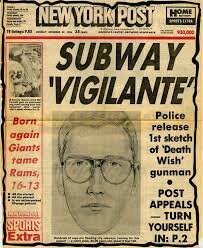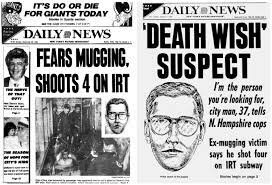
Episode 7-
'Judge, Jury, and Executioner (Part Two)'
Subscribe on Apple Podcasts, Spotify, Overcast, or your podcatcher of choice.
How a grimy New York exploitation movie inextricably altered the careers of those who made it – and how it impacted our culture, then and now.
The 1974 Charles Bronson vehicle Death Wish is far from the best New York movie of the era – but it may be the most influential. Its story of a mild-mannered upper-class Manhattan resident who responds to the rising crime rates by taking the law into his own hands, hitting the streets and taking out muggers and criminals of various types (but mostly black, brown, and poor) hit a nerve in the city, and across the country.
Its influence was reflected not only in movies – where it beget a series of sequels, imitators, remakes, and rip-offs – but in the culture, where its noble image of the one-man justice squad often resulted in messier outcomes than onscreen. And it altered the lives of several of its participants, including star Bronson (who found himself typecast for the rest of his career) and Brian Garfield, author of the book that inspired it, who spent the rest of his life crusading against the film adaptation’s mangled message.
We’ll explore all of that and more in this two-part episode. Our guests for part two are New Yorker staff writer Jelani Cobb, film historians and pop culture critics LaToya Ferguson, Matt Prigge, and Paul Talbot, and filmmaker (and Death Wish 3 co-star) Alex Winter.
SHOW NOTES
Audio from Death Wish (1974), directed by Michael Winner.
Paul Talbot was interviewed on April 28, 2021. He is the author of Bronson’s Loose! On the Set of the Death Wish Films, a key source for this episode, as well as Bronson’s Loose Again! On the Set with Charles Bronson.
Matt Prigge was interviewed on April 25, 2021. Matt is is a journalism professor with bylines at Uproxx, Vulture, The Guardian, and Polygon. You can follow him on Twitter @mattprigge.
Audio of Michael Winner discussing Charles Bronson (and, later, discussing the film’s impact) is from a BBC set report on Death Wish II, which you can watch here.
The Bronson “his approach to life is gentle” and “I’m only a product” quotes come from this interview with Roger Ebert. “What I’m doing isn’t art” quote from Bronson’s Loose! “We don’t make movies for critics” quote here. The Village Voice interview, titled “Charles Bronson Is Still Pleading Poverty” (from the January 12, 1976 issue) was pulled from the Death Wish archive in the clippings file in the Billy Rose Theater Division of the New York Public Library for the Performing Arts. “Don’t ask me to explain a mystique” quote from this New York Times profile. “Too violent” quote from Bronson’s Loose!
Alex Winter was interviewed on April 29, 2021. His latest documentary, Zappa, is now available on Blu-ray, DVD, and POV; it’s also streaming on Hulu. You can follow him on Twitter @winter.
The Brian Garfield interview from Movie Geeks United can be heard here.
Information of Garfield trying to snuff out the Death Wish TV sale is from Variety (December 17, 1975), New York Post (October 29, 1976) and the New York Daily News (December 12, 1975 and November 5, 1976); on Hopscotchas “penance” from Variety (June 11, 1976). All from the Death Wish archive in the clippings file in the Billy Rose Theater Division of the New York Public Library for the Performing Arts. More on his reaction to the film (and potential return to the franchise) from Bronson’s Loose!
More on (Mayoral candidate!) Curtis Sliwa and the Guardian Angels faking assaults for publicity here and here.
Starring New York: Filming the Grime and the Galmour of the Long 1970s by Stanely Corkin can be found here. Info on Paramount’s publicity campaigns is from Bronson’s Loose!
The Fern Marja Eckman audience reaction piece, titled “’Death Wish’: Wild, Wild East,” appeared in the New York Post on Monday, August 5, 1974. From the Death Wish archive in the clippings file in the Billy Rose Theater Divisionof the New York Public Library for the Performing Arts.
The New York Daily News item “’Death Wish’ Factor in 3 Killings?’ appeared in the September 27, 1980 edition. From the Death Wish archive in the clippings file in the Billy Rose Theater Division of the New York Public Library for the Performing Arts.
The Goetz confession video can be seen on YouTube here. Koch, Sliwa, and call-in radio audio from this Special Report. Information on the Goetz shootings from Ed Koch and the Rebuilding of New York City by Jonathan Soffer, Starring New York by Stanley Korkin, and the New York Times here, here, and here. D’Amato’s quote editorial is here.
Michael Winner’s quote about Goetz as copycat, to Melody Maker in 1985, is from Bronson’s Loose! Bronson’s quote, sourced to 1987, was widely circulated in obituaries after his death.
Canby’s “New York City, like all major American cities, has its problems” quote, and the later quote comparing the film to Little Murders, are from “Death Wish Exploits Fear Irresponsibly,” here.
LaToya Ferguson was interviewed on May 15, 2021. She has bylines at AV Club, Variety, and many more, and is the managing editor of RondaRousey.com. She also co-hosts the “Angel on Top” and “AMPire Diaries” podcasts. You can follow her on Twitter @lafergs.
Jelani Cobb was interviewed on September 10, 2020. He is a staff writer at the New Yorker, and co-editor of the books The Essential Kerner Commission Report and The Matter of Black Lives: Writing from the New Yorker. Both are available now. You can read the “Blood on the Leaves” piece we quote here, and follow him on Twitter @jelani9.
The New York Times crime piece quoted is here.
Music:
Revolution Void - “Line of Flight,” “Invisible Walls,” “Obscure Terrain,” “The Modern Divide”
Eric Steur - “Bust a Rap Like Nobody's Listening”
The Insider - “A Little Woozy I Guess,” “Right”
Sergey Cheremisinov - “Northern Lullaby”
Opening Theme:
Our opening theme features sound from the following films: Coogan’s Bluff, Sweet Smell of Success, Quick Change, The Freshman, Death Wish, Death Wish 3, Taxi Driver, 25th Hour, and The Taking of Pelham One Two Three.












